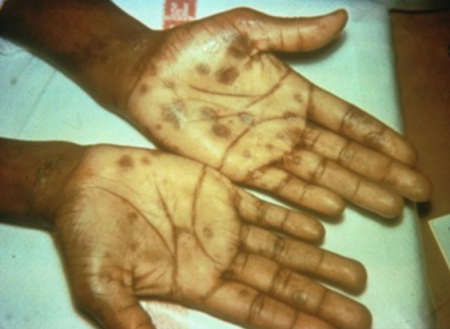P
PressRoom
Guest
Syphilis is a bacterial infection usually spread by sexual contact. The disease starts as a painless sore — typically on your genitals, rectum or mouth. Syphilis spreads from person to person via skin or mucous membrane contact with these sores.
After the initial infection, the syphilis bacteria can lie dormant in your body for decades before becoming active again. Early syphilis can be cured, sometimes with a single injection of penicillin. Without treatment, syphilis can severely damage your heart, brain or other organs, and can be life-threatening, or be passed from mother to an unborn child.

Causes of Syphilis
Syphilis is caused by a bacterium called Treponema pallidum. The most common route of transmission is through contact with an infected person's sore during sexual activity. The bacteria enter your body through minor cuts or abrasions in your skin or mucous membranes.
In addition to spread during sexual activity, syphilis can be spread from mother to baby during pregnancy, referred to as congenital syphilis.
Syphilis during pregnancy can result in a stillborn birth or a low birthweight baby, and if left untreated, a baby with syphilis can develop cataracts, deafness, or seizures. In some cases, infants can die from the disease.
Syphilis CANNOT be spread by using the same toilet, bathtub, clothing or eating utensils, or from doorknobs, swimming pools or hot tubs.
Symptoms of Syphilis
The symptoms of syphilis aren't always obvious and may eventually disappear, but you'll usually remain infected unless you get treated. Some people with syphilis have no symptoms.
Symptoms can include:
Risk Factors
You face an increased risk of acquiring syphilis if you:
Article culled from health-related contents, videos.
After the initial infection, the syphilis bacteria can lie dormant in your body for decades before becoming active again. Early syphilis can be cured, sometimes with a single injection of penicillin. Without treatment, syphilis can severely damage your heart, brain or other organs, and can be life-threatening, or be passed from mother to an unborn child.

Causes of Syphilis
Syphilis is caused by a bacterium called Treponema pallidum. The most common route of transmission is through contact with an infected person's sore during sexual activity. The bacteria enter your body through minor cuts or abrasions in your skin or mucous membranes.
In addition to spread during sexual activity, syphilis can be spread from mother to baby during pregnancy, referred to as congenital syphilis.
Syphilis during pregnancy can result in a stillborn birth or a low birthweight baby, and if left untreated, a baby with syphilis can develop cataracts, deafness, or seizures. In some cases, infants can die from the disease.
Syphilis CANNOT be spread by using the same toilet, bathtub, clothing or eating utensils, or from doorknobs, swimming pools or hot tubs.
Symptoms of Syphilis
The symptoms of syphilis aren't always obvious and may eventually disappear, but you'll usually remain infected unless you get treated. Some people with syphilis have no symptoms.
Symptoms can include:
- Small, painless sores or ulcers that typically appear on the penis, vagina, or around the anus, but can occur in other places such as the mouth.
- A blotchy red rash that often affects the palms of the hands or soles of the feet
- Small skin growths (similar to genital warts) that may develop on the vulva in women or around the anus in both men and women
- White patches in the mouth
- Tiredness, headaches, joint pains, a high temperature (fever), andswollen glands in your neck, groin or armpits
Risk Factors
You face an increased risk of acquiring syphilis if you:
- Engage in unprotected sex
- Have sex with multiple partners
- Are a man who has sex with men
- Are infected with HIV, the virus that causes AIDS
Article culled from health-related contents, videos.

